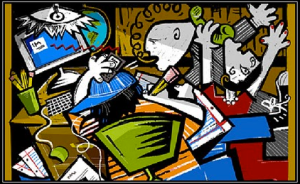I used to consider writing a proactive activity requiring time and motivation. But my current lit professor has effectively broadened my view. Writing is also a defensive tool meant to help us sift through and respond to the information onslaught of our sometimes chaotic world.
Information Overload
Not too long ago, people were starved for information and would go to great lengths to gather it. Self-education on any given topic was not easy. Informal research used to be a somewhat painful process filled with digging and dead-ends. But that is no longer the norm.
We used to chase information, but now information chases us. A few keystrokes bring up gazillions of pages filled with opinions and facts on every topic imaginable. Television, radio, magazines, newspapers, email, blogs, automated phone messages. Billboards and other signs along the roadways demand attention with flashing lights and even sirens. Fliers in the mail, and on my car, and inside my screen door; they’re totally inescapable! Community leaders, politicians, protesters, and even that poor sap  dressed up like the statue of liberty, dancing around on the busiest street corner in your neighborhood is trying to shove some tidbit down your throat about pizza or taxes or whatever.
dressed up like the statue of liberty, dancing around on the busiest street corner in your neighborhood is trying to shove some tidbit down your throat about pizza or taxes or whatever.
Don’t get me wrong, I am grateful to have information so readily available. However, it’s safe to say that the amount of information swirling around can be overwhelming. And if we’re not careful, it’s easy to drown in the current. I’ve been there a few times, and I’m sure you’ll concur. So what are we to do?
Write back.
Defensive Writing
When my professor first suggested this, I was quite flabbergasted. With all the time it takes to work through the information presented on any given day, I couldn’t believe he was suggesting that we take even more time to create more information. I was concerned that he was only adding to the stress of my life.
But I dutifully began to record my thoughts as they came. And surprisingly, I found that it did not add information overload, it helped decrease information overload. Responding to information and recording our responses allows us to sift and process information, then set it aside until we need it again. It frees up space in our brain for the next onslaught. It’s like constantly emptying our “in-box.”
This concept makes me think of… laundry. No, seriously! Pretend it’s washday and the dryer has finished a batch. If we attempt to just hold in our arms all the clean, dry laundry as it comes out, we will soon be dropping things, which will lead to the loss and destruction of our clean, dry laundry. Plus we will be ill prepared to handle the next batch and soon completely overwhelmed. But if we fold those clothes and put them away—or process them—our arms will be empty and ready for the next batch.
Using Information
Information by itself is useless. Information merely gathered is only helpful to the gather-er. But when we respond to information, we create a dialogue that benefits all within earshot, especially ourselves. Information is usually intended to be helpful, but that can only happen if it is sifted, processed, and responded to.
So now that you’ve been curious enough to read my information, give it a try. Leave me a comment, or open up a new word file and jot down your response.